Is Your Cat Losing Weight? Discover the Common Causes and How to Help!

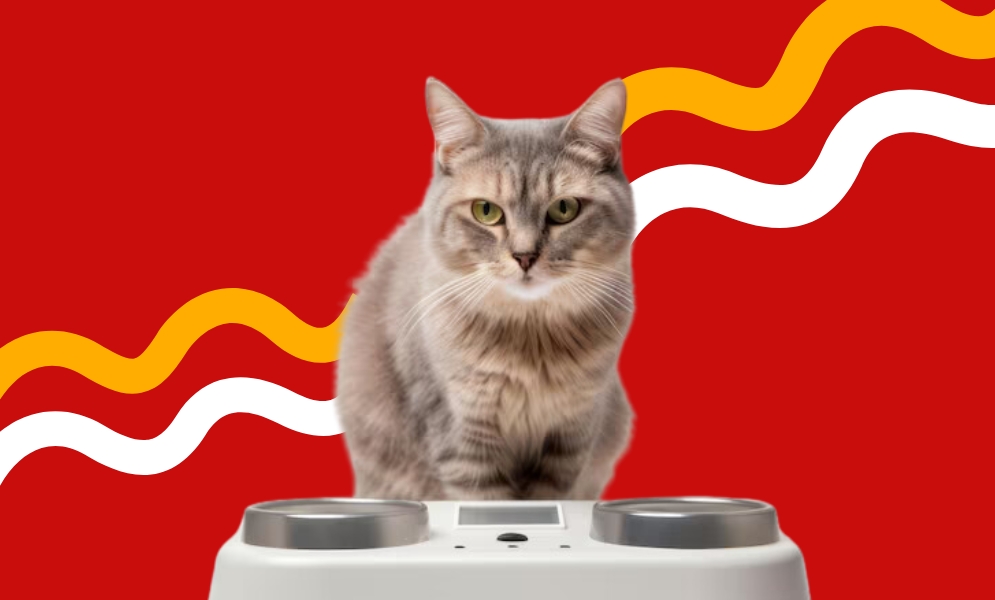
For pet parents, witnessing your cat losing weight can be a concerning experience. Cats are known for their finicky eating habits, but a significant drop in their weight could indicate an underlying issue that requires attention.
In this comprehensive guide, we’ll explore the common causes of weight loss in cats, the signs to watch out for, and effective strategies to help your furry companion regain a healthy physique.
Common Causes of Cats Losing Weight
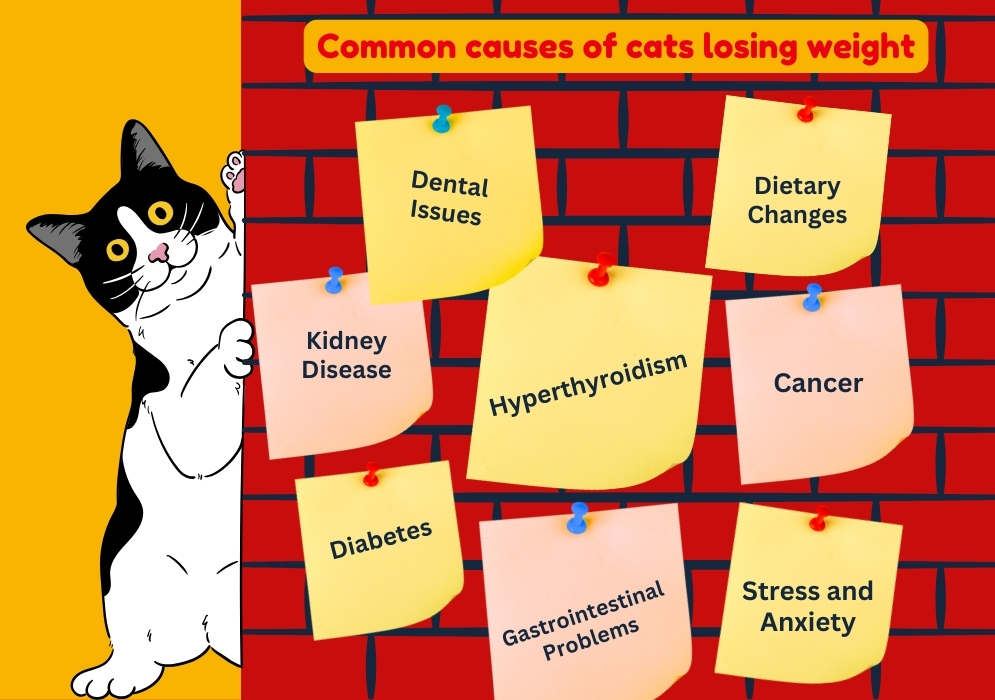
Fluctuations in a cat’s weight can occur for various reasons, ranging from dietary changes to medical conditions. It’s crucial to understand that weight loss in cats is not always a cause for alarm, but it’s essential to monitor the situation closely and take appropriate action if necessary.
Identifying the root cause of your cat’s weight loss is the first step in addressing the issue effectively. Several factors can contribute to a cat’s gradual or sudden weight loss, including:
Dietary Changes
Alterations in your cat’s diet, such as switching to a new food brand or type, can sometimes lead to temporary weight loss. Cats can be finicky eaters, and adjusting to a new taste or texture may initially cause them to consume less food.
Dental Issues
Dental problems like gum disease, tooth decay, or oral infections can make it painful for your cat to eat, leading to decreased food intake and subsequent weight loss.
Gastrointestinal Problems
Conditions like inflammatory bowel disease, pancreatitis, or intestinal parasites can interfere with your cat’s ability to absorb nutrients properly, resulting in weight loss despite adequate food intake.
Diabetes
Uncontrolled diabetes can cause excessive thirst, increased urination, and weight loss in cats due to the inability to properly utilize glucose for energy.
Hyperthyroidism
This condition, more common in older cats, causes an overactive thyroid gland, leading to an increased metabolism and subsequent weight loss, despite a good appetite.
Kidney Disease
Chronic kidney disease can cause nausea, loss of appetite, and weight loss in cats as the kidneys struggle to filter waste products effectively.
Cancer
Certain types of cancer, such as lymphoma or gastrointestinal tumors, can lead to weight loss due to decreased appetite, nutrient malabsorption, or the body’s increased energy demands.
Stress and Anxiety
Environmental changes, the introduction of new pets, or stressful situations can trigger anxiety in cats, leading to a loss of appetite and subsequent weight loss.
Understanding the potential causes of weight loss in your cat is the first step towards finding an effective solution. If you notice your cat shedding pounds, it’s essential to monitor their behavior, appetite, and overall health closely and consult with your veterinarian for a proper diagnosis and treatment plan.
Associated Signs to Look Out for in an Underweight Cat
In addition to monitoring your cat’s weight, there are several signs and symptoms to watch out for that may indicate an underlying issue causing their weight loss. These include:
- Decreased Appetite: A noticeable reduction in your cat’s appetite or a complete refusal to eat can be a clear sign of an underlying problem.
- Lethargy: If your once-energetic feline friend becomes lethargic, sluggish, or spends most of their time sleeping, it could be a sign of illness or malnutrition.
- Dull Coat: A dull, unkempt, or matted coat can be a sign of poor nutrition or dehydration, which can contribute to weight loss.
- Vomiting or Diarrhea: Persistent vomiting or diarrhea can lead to dehydration and nutrient loss, resulting in weight loss.
- Increased Thirst and Urination: These symptoms can indicate diabetes or kidney disease, both of which can contribute to weight loss.
- Breathing Difficulties: Labored breathing or wheezing may be a sign of an underlying respiratory issue or heart disease, which can impact a cat’s appetite and overall health.
By being vigilant and observing your cat’s behavior, appetite, and overall appearance, you can catch potential health issues early and take appropriate action to address their weight loss.
Creating a Healthy Feeding Routine for Your Cat
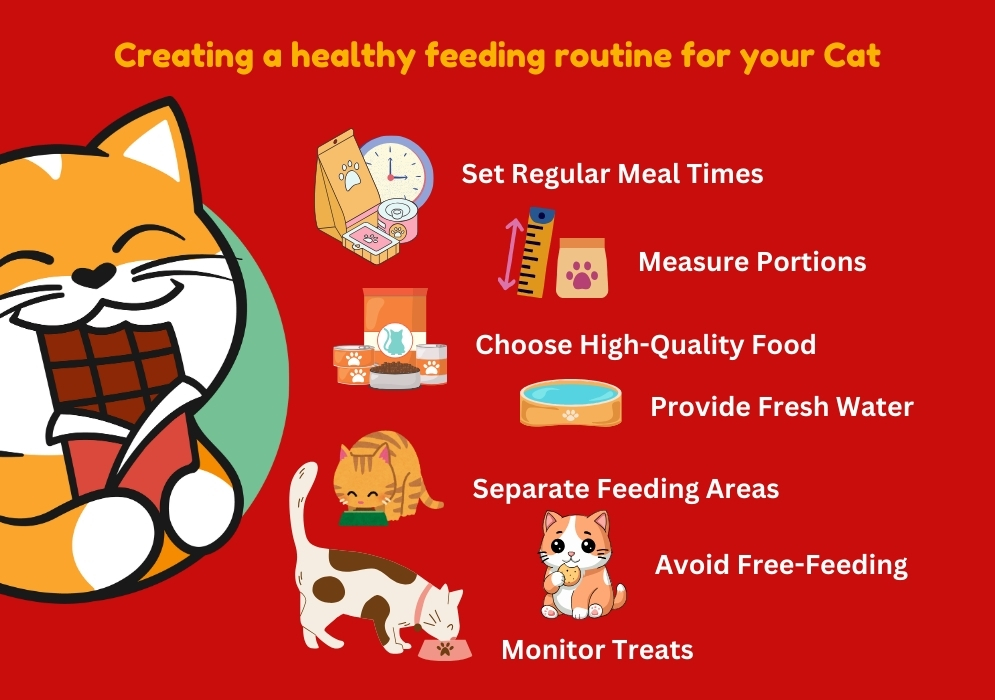
Establishing a healthy feeding routine is crucial for maintaining your cat’s weight and overall well-being. Here are some tips to help you create a balanced and consistent feeding schedule:
Set Regular Meal Times
Cats thrive on routine, so establish set meal times and stick to them as closely as possible. This helps regulate their appetite and prevents overeating or begging for food throughout the day.
Measure Portions
Measure your cat’s food portions accurately using a measuring cup or scale. Overfeeding, even with high-quality food, can lead to weight gain and related health issues.
Choose High-Quality Food
Opt for high-quality, nutrient-dense cat food that is appropriate for your cat’s age, activity level, and any specific dietary requirements. Consult with your veterinarian for recommendations.
Provide Fresh Water
Ensure your cat has access to clean, fresh water at all times. Proper hydration is essential for overall health and can aid in weight management.
Separate Feeding Areas
If you have multiple cats, consider separating their feeding areas to prevent competition or one cat from overeating due to the presence of others.
Avoid Free-Feeding
While convenient, free-feeding (leaving food out all day) can lead to overeating and weight gain. It’s best to establish set meal times and remove any uneaten food after a reasonable amount of time.
Monitor Treats
Treats should be given in moderation and accounted for in your cat’s daily calorie intake. Choose low-calorie, high-protein treats or consider using a portion of their regular food as a treat.
By establishing a consistent and healthy feeding routine, you can help your cat maintain a balanced weight, prevent overeating, and promote overall well-being.
Cat Losing Weight? Why You Need To Consult a Veterinarian
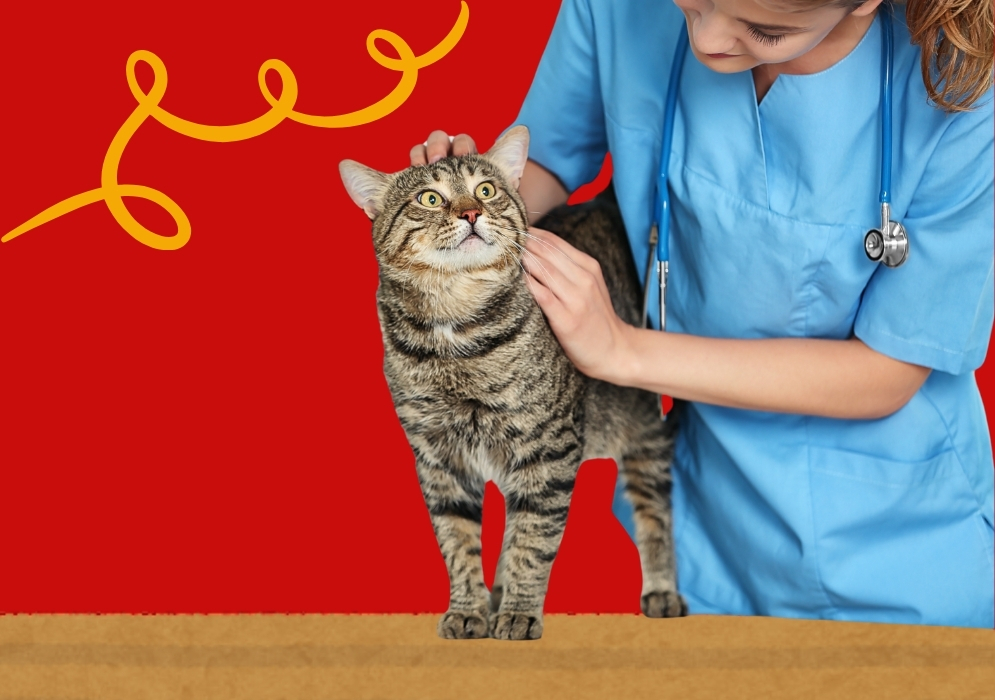
While you can take steps to help your cat lose weight at home, it’s essential to consult with a veterinarian to develop a comprehensive and safe weight loss plan.
Here’s why seeking professional guidance is crucial:
Identify Underlying Causes
Your veterinarian can perform a thorough physical examination and run necessary tests to identify any underlying medical conditions that may be contributing to your cat’s weight loss or gain. This information is crucial for developing an effective treatment plan.
Determine Ideal Weight
Your veterinarian can assess your cat’s body condition score and determine their ideal weight based on factors such as age, breed, and overall health status. This helps set realistic and achievable weight loss goals.
Develop a Customized Diet Plan
Based on your cat’s specific needs, your veterinarian can recommend a tailored diet plan that provides the right balance of nutrients while promoting gradual and safe weight loss. This may involve prescription weight management diets or specific dietary adjustments.
Monitor Progress
Regular check-ups with your veterinarian allow for monitoring your cat’s weight loss progress and making adjustments to the plan as needed. Your vet can also identify and address any potential complications or setbacks.
Address Concurrent Health Issues
If your cat is dealing with other medical conditions, such as diabetes or thyroid disorders, your veterinarian can ensure that the weight loss plan takes these into account and does not exacerbate any existing health issues.
Provide Guidance on Exercise
Your veterinarian can recommend appropriate exercise and activity levels based on your cat’s age, weight, and overall health condition. This helps ensure that the exercise plan is safe and effective for weight management.
Offer Ongoing Support
Throughout the weight gain journey, your veterinarian can provide ongoing support, answer any questions or concerns you may have, and celebrate your cat’s progress with you.
By working closely with a veterinary professional, you can ensure that your cat is gaining weight safely and effectively. This collaborative approach increases the chances of success and helps maintain your cat’s overall well-being.






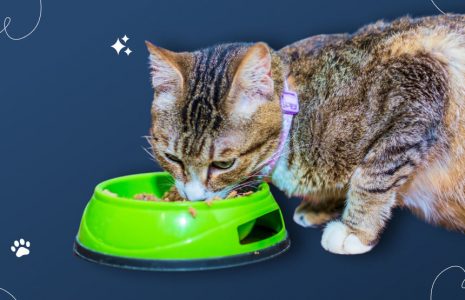
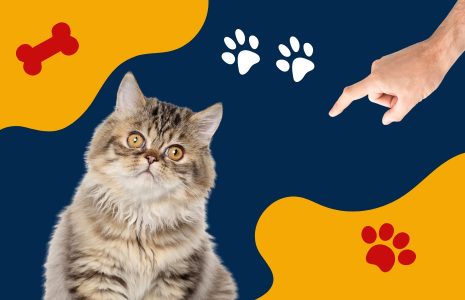
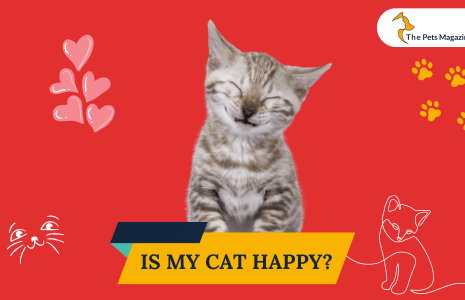
Leave A Comment